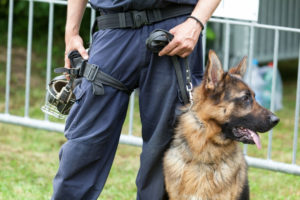
As drugs continue to plague Minnesota and the United States as a whole, law enforcement are looking into new ways to catch individuals in possession of drugs or drug paraphernalia. One method that has become more popular lately is the use of a drug sniffing dog. But what can these dogs detect, and how can they legally be used during an interaction with a citizen? We answer those questions and more in today’s blog.
The Legality Of Police Drug Dogs
Currently, the Minnesota State patrol has 15 drug sniffing dogs throughout the state, and they are trained to signal officers if they detect a certain scent, like a drug or an explosive. But can police officers use these dogs whenever they want during a traffic stop? To answer that question, we turn to a previous case out of Nebraska.
The case is question is Rodriguez v. United States, and it went all the way up to the US Supreme Court. The case began when Rodriguez was pulled over by an officer for a driving infraction. The traffic stop was conducted normally, with the officer asking for and receiving Rodriguez’s driver’s license, registration and proof of insurance.
After running the information, the officer returned to the vehicle and asked the person in the passenger’s seat for identification. The passenger’s information came back clean, and on the officer’s third interaction with the occupants, he gave the driver a written warning and asked if he would let the officer walk the K-9 unit around his car. Rodriguez said no, and the officer asked him to step out of the car while backup arrived. The second unit arrived and the drug dog was walked around the vehicle. On his second pass, the dog signaled that there were drugs in the car, and a subsequent search uncovered a small amount of methamphetamine.
At that point, the car had been stopped on the side of the road for a half hour, and it had been eight minutes since the warning was issued. Rodriguez argued that the search was a violation of his Fourth Amendment rights, which protects citizens from unreasonable searches and seizures. The US Supreme Court ruled that officers can use drug sniffing dogs during a traffic stop, even if they do not receive permission from the driver, but there’s a catch. According to the Supreme Court, if the officer does not have reasonable suspicion, then the traffic stop cannot be prolonged in order to allow a drug dog to assess the vehicle.
In their ruling, the Supreme Court ruled that because the officer did not have reasonable suspicion, and because the searched prolonged the normal traffic stop interaction, that the search was in fact illegal, and the drugs were not admissible in court.
What To Do If The Drug Dogs Find Your Drugs
Remember, this only comes into play if the officer does not have reasonable suspicion, or if you deny permission for a search. If the officer says they smell marijuana or you give them permission to conduct a search, then it’s a “legal” search even if it extends beyond the duration of a standard traffic stop. We put legal in quotations because if the officer says he smells marijuana, there is none in your vehicle, but a drug dog search turns up cocaine, you may be able to challenge the legality of the search.
If you ended up being charged with possession of drugs or illegal substances after being subjected to a drug dog search that you did not agree to, reach out to Avery Appelman and his team at Appelman Law Firm. If police didn’t follow protocol, we can get the case dismissed. You have rights, and we’ll fight for them. Contact us today for a free case evaluation.





